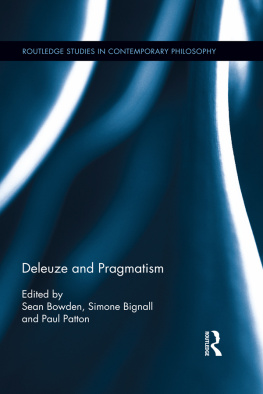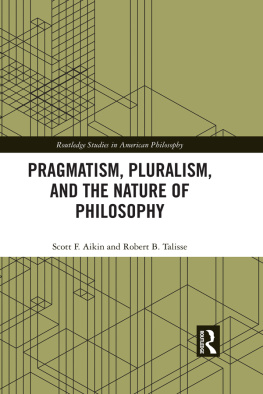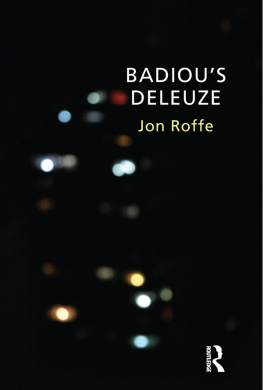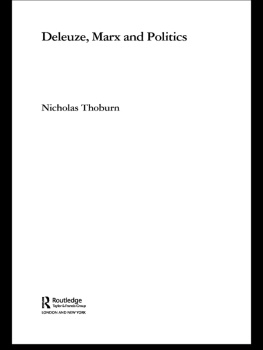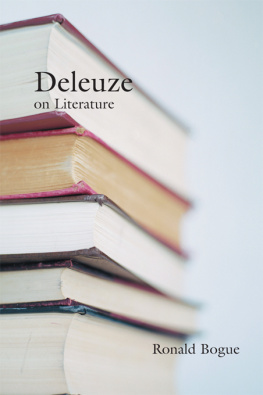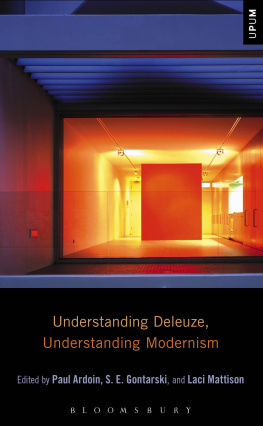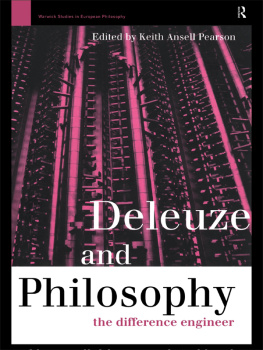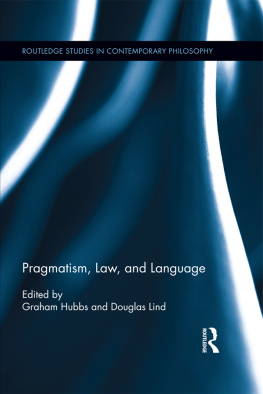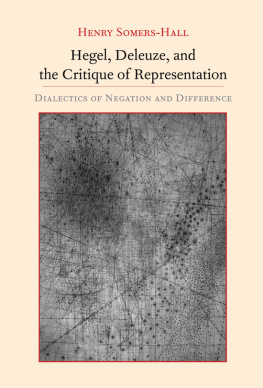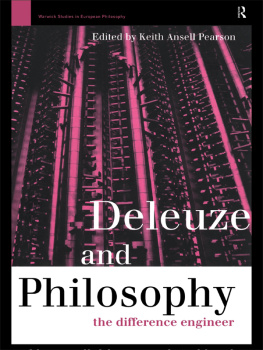1
Infinite Pragmatics
Jeffrey A. Bell
Much of the discussion that compares the work of Deleuze and Peirce has focused upon Peirces theory of signs. This is understandable given the emphasis Deleuze himself places on Peirces typology of firstness, secondness, and thirdness in his Cinema books, as well as the importance of a theory of signs in his Proust and Signs . In the following chapter I will explore a subtler but equally significant interplay between the work of Deleuze and Peirce by showing how they both come to use a concept of habit in order to account for the emergence of individuated, determinate identities; moreover, this account of the emergence of individuated identities by way of habits (or passive syntheses, as Deleuze will argue) entails the necessary affirmation of the actual infinite, or the possibility of supertasks.
The importance of passive synthesis as set forth in the second chapter of Difference and Repetition has been routinely discussed. What is of particular significance for our purposes is that with the notion of passive synthesis, Deleuze is able to argue for a process whereby an identity comes to be individuated in a way that does not presuppose an identity that predetermines the processit presupposes, instead, an actual infinite or indeterminate chaos. Something comes to be the identifiable, individuated thing that it is not because it actualizes a predetermining essence but rather because the active, indeterminate, and infinite processes become contracted into a habit, and it is only then that it takes on the formal, identifiable features by which we come to identify this something as the determinate individual it is. Although this theme has been widely discussed among Deleuze scholars, it is a lesser-known theme among Peirce scholars. But the importance of habit, it will be argued, is, in precisely the Deleuzian sense just sketched, equally important for Peirce in accounting for the individuation of things. That habit is integral to Peirces theory of belief is well established, but its ontological and metaphysical significance, and its implications for understanding pragmatism, have not received the attention they deserve.
In the first section I will introduce the problem of supertasks and discuss the traditional response to this problem, which has been, simply put, to reject the possibility of such tasks, or, as this is more commonly known in the literature, to reject the actual infinite. The second section will turn to Kants First Antinomynamely, the problem of believing whether or not the world has a beginning in time. Kant argues that neither option is tenable, and this is primarily because a belief in such a world would involve a super-task. To avoid the antinomy, Kant rejects the very notion of a world in itself and as a consequence any belief in the world. This leads us to the third section where I will argue that Peirces metaphysics sets out to restore a belief in the world, and belief in an infinite world. The fourth and final section shows how a key concern of Deleuzes project was precisely to restore belief in the world, a belief that involves the supertask of affirming the actually infinite, which occurs, as mentioned above, in the processes of individuation, or in the passive synthesis and contraction of habits that are inseparable from determinate realities. It is at this point where the metaphysical implications of pragmatism come to fruition in Peirceimplications that are then taken up by Deleuze, and especially by Deleuze and Guattari in What Is Philosophy? where an instance of the affirmation of the infinite occurs with the philosophical task of creating concepts. I will call this task infinite pragmatics.
I
Let us begin with an example. I put an apple on a table, wait half a minute, and then remove the apple. I wait a quarter of a minute and put the apple back on the table, removing it after 1/8th of a minute, putting it back on after 1/16th of a minute, and so on ad infinitum . Let us assume for the sake of the argument that at the end of one minute I have completed an infinite sequence of placing and removing the apple. At the end of the minute, is the apple on the table or not? This question seems unanswerable and has led many to assume that such a task, often called a supertask, is impossible. Zeno, however, in his well-known paradox of Achilles and the tortoise, sought to show that if such supertasks are indeed impossible, then even the most mundane of tasks becomes impossible as well, despite all appearances to the contrary. As Aristotle recounts Zenos paradox, the conclusion one is led to is that the quickest runner can never overtake the slowest, since the pursuer must first reach the point whence the pursued started, so that the slower must always hold the lead (Aristotle 1984, 239b15). If the tortoise has a ten-meter lead on Achilles, and even if Achilles runs ten times faster than the tortoise, he must first reach the point where the tortoise was, and since there is an infinite series of such points, Achilles will never catch the tortoise because he must first reach an infinite number of points. But clearly Achilles will catch the tortoise. Given enough information, a simple mathematical calculation will enable us to determine at what point the two will be tied, after which Achilles will take the lead. So has Achilles performed a supertask?
The standard response to this question, beginning with Aristotle and continuing on through Peirce and beyond, is to say that of course Achilles did not actually have to do the impossible and reach an infinite number of points in the process of catching up to the tortoise. For Aristotle, what Zeno fails to recognize is that there is an important difference between the actual distance covered between any two points in a given finite amount of time and the potential for this distance or time to be subdivided to infinity. On Aristotles view, the actual is finite, not infinite; and the infinite is only the potential to continually divide the actual ad infinitum but without actually ever reaching the infinite. Peirce will likewise agree with Aristotle that Achilles does not actually reach an infinite number of points in catching up with the tortoise, but this is for a significantly different reason. Peirce counters Zenos paradox as follows:
All the arguments of Zeno depend on supposing that a continuum has ultimate parts. But a continuum is precisely that, every part of which has parts, in the same sense. Hence he makes out his contradictions only by making a self-contradictory supposition. In ordinary and mathematical language, we allow ourselves to speak of such parts points and whenever we are led into contradiction thereby, we have simply to express ourselves more accurately to resolve the difficulty.
In short, we never reach points , for they are simply tropes, manners of speaking, and what we might in everyday or mathematical language speak of as a point is itself composed of partsparts that are in turn composed of parts, and so on ad infinitum . Zenos mistake was thus twofold. First, Zeno failed to see that the continuum is irreducible to points, with points being merely abstractions from the continuum, and yet it was precisely the points reached along the way to catching the tortoise that did the heavy lifting in Zenos formulation of the paradox. His second mistake was to be confused by language itself. In both mathematical and ordinary language we will speak of points or parts, but in doing so Peirce claims we overlook the reality that is the continuum. If we are to avoid the contradictions that give rise to paradoxes such as Zenos, then for Peirce it is necessary to align our everyday and mathematical language with the ontological reality of the continuum.
Peirce is willing to draw upon the resources of pre-Kantian metaphysics, albeit while fully aware of the Kantian critical project, and as a result Peirce is much less adverse to affirm a metaphysics of the infinite than most of the philosophers who follow in his wake. Deleuze will continue in this Peircean direction as he develops his own metaphysical position, which I will call infinite pragmatics. For present purposes, and in order to connect Peirce to Deleuzes understanding of philosophy as the creation of concepts, I want first to highlight the problem of the infinite that is associated with grasping the extension of a concept. To state the problem differently: does grasping a concept and its corresponding extension entail performing a supertask, and if so, does this invalidate the act itself? In what way does understanding the concept lemur, banyan tree, or even Descartess concept of the cogito entail performing a supertask? One can follow Hume from his Treatise . There Hume argues that an abstract idea is neither an idea that is abstracted from all the qualities and quantities of the particular such that it becomes the idea of nothing in particular, nor is it an abstract idea that synthesizes all the qualities and quantities of the particular that fall under it, for this would indeed imply an infinite capacity in the mind, (Hume 1978, 18), or a supertask that would be impossible. Humes solution is to reduce an abstract idea to a custom or habit that is revived each time we see a particular of a given type. Kant, on the other hand, rejects Humes solution, although he also rejects the notion that an idea or concept entails an infinite capacity or supertask. Kant thus moves to transcendental idealism in order to restore the viability of concepts without affirming the actual infinite. For Peirce and Deleuze, however, a concept involves a supertask, and far from invalidating the reality or possibility of such concepts, it is the actual infinite itself that is the condition for the possibility of concepts. To begin to see how this works, let us turn to Kant.

